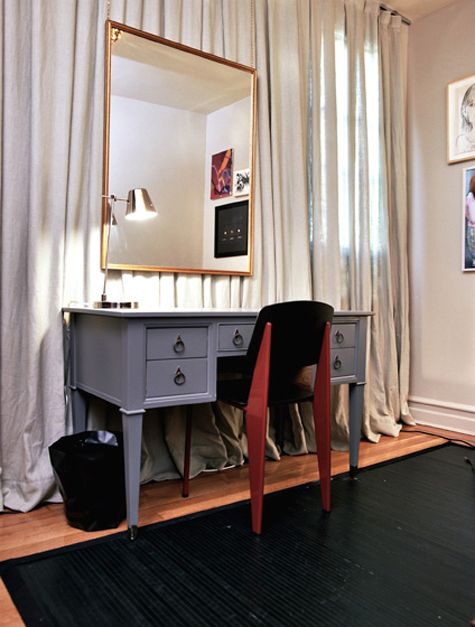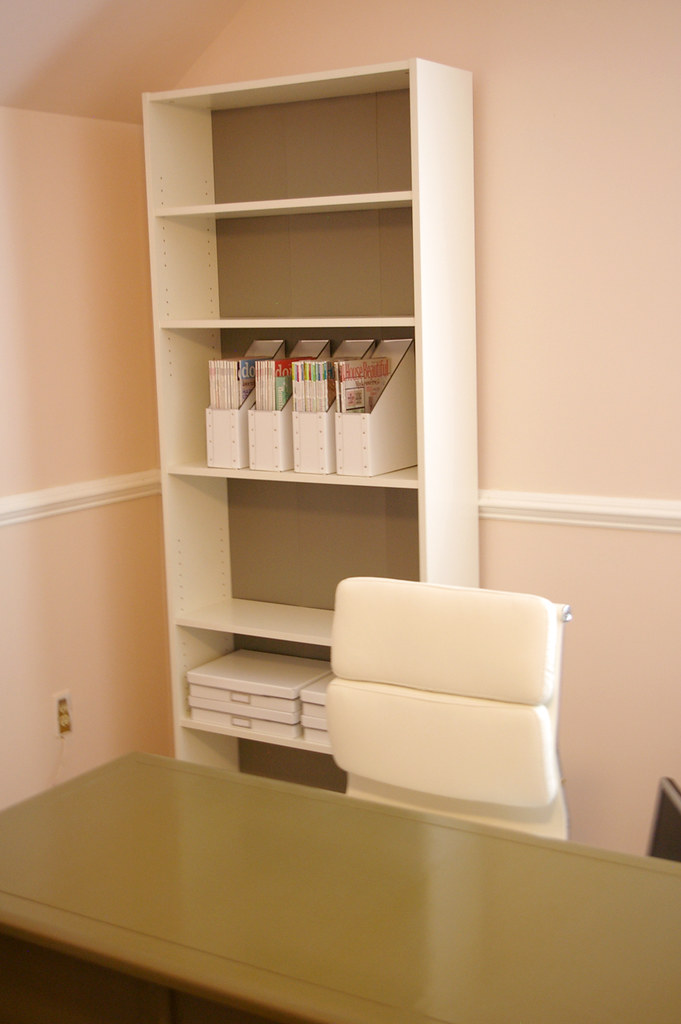
I know, the picture isn't too flattering. But trust me on this one!
And thanks to IKEA and their affordable drapes, you could easily create a look like this:


































More and more couples are deciding that having a family is not for them (others yet waiting longer to take the plunge), many citing their finances and a higher cost of living as a reason. While I believe that those who really want kids will always find a way to afford it, there may be some truth to this premise. Don’t "kid" yourself: children are expensive and can financially ruin those who aren’t prepared for all the expenses – both obvious and otherwise.
Here are some financial considerations to plan and account for prior to sprouting your own little guys.
Although I know of some parents who managed to take little more than a long weekend to pop out their progeny before returning to work, the norm (and preference, thank goodness) still is to take some time off to acclimatize baby to their new world, and adjust to the parenthood lifestyle.
But these days mum isn’t the only one with the option of taking time off; many workplaces respect paternity leave. So between the two of you, who will take time off from work, or how will you divide your respective absences? Whose income is higher or occupation requires more attention? Do you have the option of paid leave, or must you take an unpaid leave of absence? How good is your job security and ability to return to work after your leave?
For those who are self-employed, you will be relegated to an unpaid leave and possible loss of business…or else going back to work right away. Don’t fool yourself: you will not be able to bounce your baby on one knee and office work on the other; new parents are always amazed at how completely occupying their baby can be.
In addition to all the wonderful baby expenses like food, diapers, toys, clothing, and so on, you may have to consider paying for all this – and your regular expenses – on one income. Many mums (or dads) choose to stay home with the baby for longer than the prescribed leave calls for, often until the kids start school. And if you plan to have more than one child, this can amount to a lot of years.
Planning for retirement tends to take a back seat during initial parenting years, and often doesn’t reappear on the radar until much later – and often too late. Initially you stop saving thinking that just the initial maternity/paternity period will be the toughest, but then childcare costs absorb everything you thought you would save, which is then replaced with schooling expenses, and so on. All of a sudden you have adult children and are standing on retirement’s doorstep without enough funds to stop working.
Especially important to consider are retirement funds for the parent taking time off. Ideally you want to have equal amounts of money in your respective retirement accounts at retirement, so you can draw two taxable incomes and pay less tax overall than if the majority of the retirement funds came from one income. To that end, the parent taking leave can consider maximizing contributions in their last year of work prior to childbirth to make the most of tax deductions and long term growth. Then keep it going with spousal contributions, utilizing the working spouse’s tax deductibility and equally contributing to both retirement plans.
If something happens to either parent, there are deeper consequences once you have kids than there was before. The surviving parent will be saddled with not only grief, but immediately the need to pay for baby’s ongoing care, additional childcare expenses, in addition to the big mortgage and lifestyle you designed for two people to fund. Although you might plan to downsize and adjust your lifestyle accordingly, this won’t be an immediate process, and life insurance can help ease the transition and prevent a total financial meltdown.
Before getting pregnant, it is prudent to figure out exactly what expenses are covered by your health plan and what additional expenses you could face. If there are complications during the pregnancy or childbirth, you could be financially ruined before you are even out of the starting gate. Most disability insurance plans don’t cover pregnancy-related illnesses, even if you are bedridden for months on end.
Some couples choose to have their baby in a country with high-quality but low-cost care (I personally know of a couple who chose to have their baby in Malaysia for this reason among others. Singapore is also a hotspot for “medical vacations”).
Eventually, most parents staying at home with the kids will return to work. However with longer and more varied working hours, this means there will be an additional cost for child care, even if it is just during the hours before and after school.
After discovering the exorbitant cost for full-time childcare (for kids younger than school age), some parents decide that since one entire salary practically goes to childcare, it would be more beneficial for them to simply stay home with the kids until they reach school age. Although this is a sound decision, don’t forget some of the non-salary benefits lost by staying home, such as health care plans, employer-funded retirement contributions, and other government plans and perks funded through taxes (the scope of which vary depending on the country you live in).
This is hard to contemplate as soon as you and baby are home from the hospital, but the clock is already ticking. With the cost of even local post-secondary education being more than a drop in the bucket, it would be best to get cracking on the savings fund. Not only that, but with time on your side, you may be able to save less money overall by using compound growth to your favor.
Having a family is a life-changing emotional decision, with emotional rewards and consequences. But planning for parenthood is a process that must be backed with logic and proper planning to avoid nasty surprises. Tread carefully and tactically, and you will enjoy many happy years of parenthood – and beyond.







Skippy PB - $3
Generic brand Beef Broth - $.59
Milk - $2.49
Bread - $4.19 (dh insists on the brand name, I would buy generic if I could)
Egg noodles - $2.19
Generic brand shredded cheese, low fat - $3.69
Lean Cuisine - $2.50
Lean Cuisine - $3.50
Spaghetti - $1.00
Generic Mini Wheats Cereal - $2.50
Fresh Mozz - $3.99
Broccoli - $1.29
Sour Cream, low fat - $1.79
Jelly - $3.50
Wine for cooking - $7.49
Potatoes - $3.22
Mushrooms - $.33
Zucchini - $2.19
Cucumbers - $1.49
Tomatoes - $3.53
Onion - $1.64
Steak - $5.09
Total (including tax) $61.78



